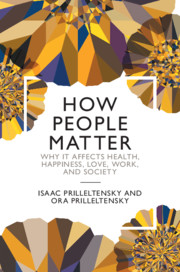Book contents
- How People Matter
- Advance Praise for How People Matter
- How People Matter
- Copyright page
- Dedication
- Contents
- Figures
- Acknowledgments
- Introduction
- Part I Understanding and Promoting Mattering
- Part II Self
- Part III Relationships
- Part IV Work
- Part V Community
- Chapter 10 Mattering in the Community
- Chapter 11 Mattering through Social Change
- Notes
- Index
Chapter 10 - Mattering in the Community
from Part V - Community
Published online by Cambridge University Press: 20 May 2021
- How People Matter
- Advance Praise for How People Matter
- How People Matter
- Copyright page
- Dedication
- Contents
- Figures
- Acknowledgments
- Introduction
- Part I Understanding and Promoting Mattering
- Part II Self
- Part III Relationships
- Part IV Work
- Part V Community
- Chapter 10 Mattering in the Community
- Chapter 11 Mattering through Social Change
- Notes
- Index
Summary
A foundational tenet of a healthy abundant community is that all of us have gifts – of the head, the heart, or the hand. For gifts to have meaning, they must be exchanged. When we create spaces for capacities and vulnerabilities to be shared, we give life to a sense of belonging. We bring our full person to the table. Associations afford people an opportunity to exchange strengths and weaknesses, sorrow and joy, resilience and fallibility. Friendship and trust emerge in communities where people balance association with similar and different people. Robert Putnam from Harvard captured this dual need in the distinction between bonding and bridging social capital. The former refers to association with like-minded people. The latter to connections with people from other backgrounds. Communities that balance bridging with bonding are healthier and stronger. They achieve better outcomes in terms of population health, education, and safety. Discrimination and inequality erode mattering in the community. Inequality of worth can be created by a number of social identifiers: money, race, class, education, disability, gender orientation, looks, language or ethnic origin.
Keywords
- Type
- Chapter
- Information
- How People MatterWhy it Affects Health, Happiness, Love, Work, and Society, pp. 219 - 242Publisher: Cambridge University PressPrint publication year: 2021

